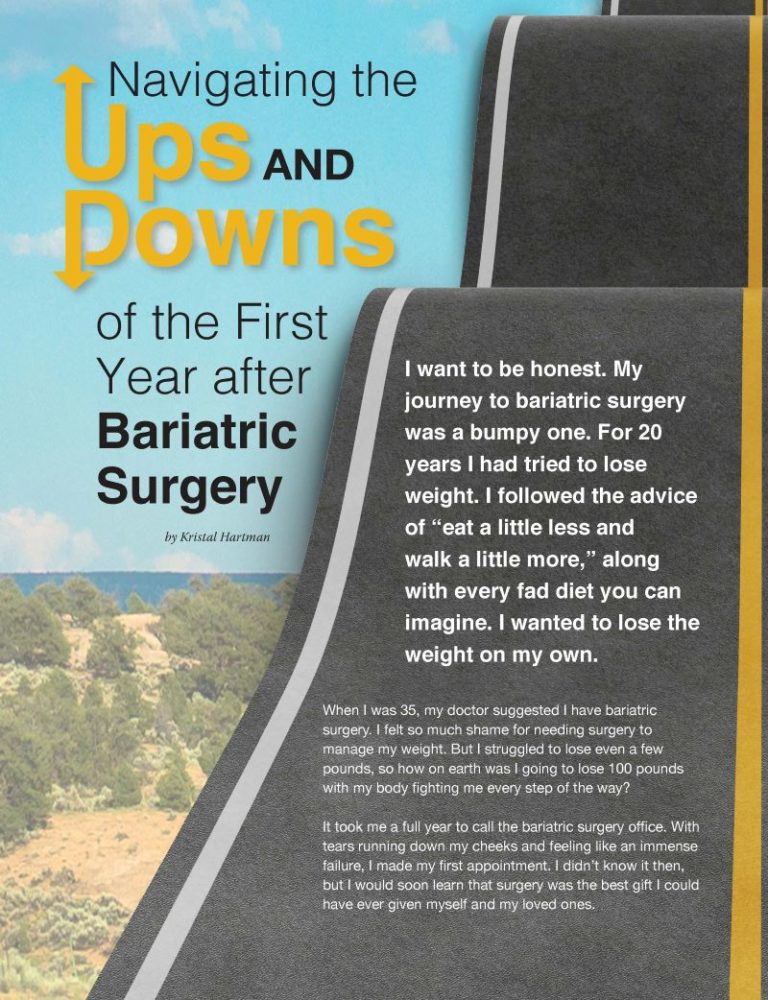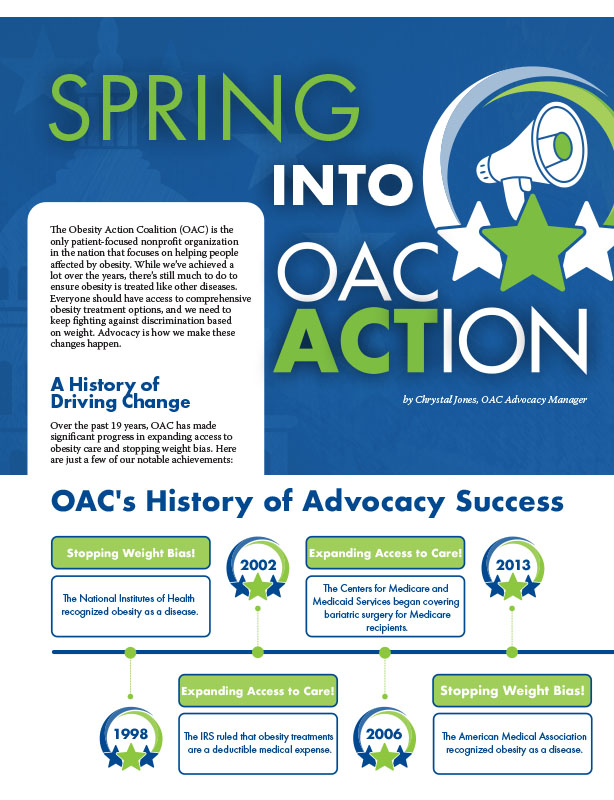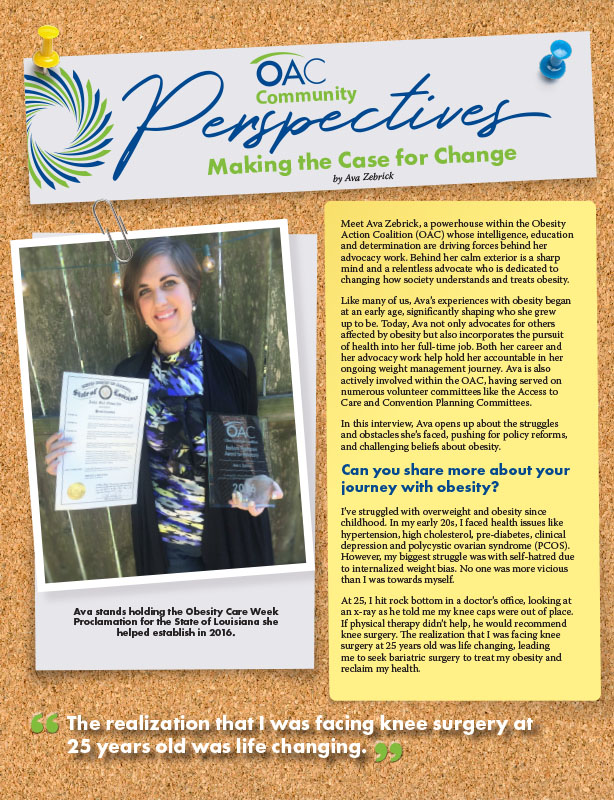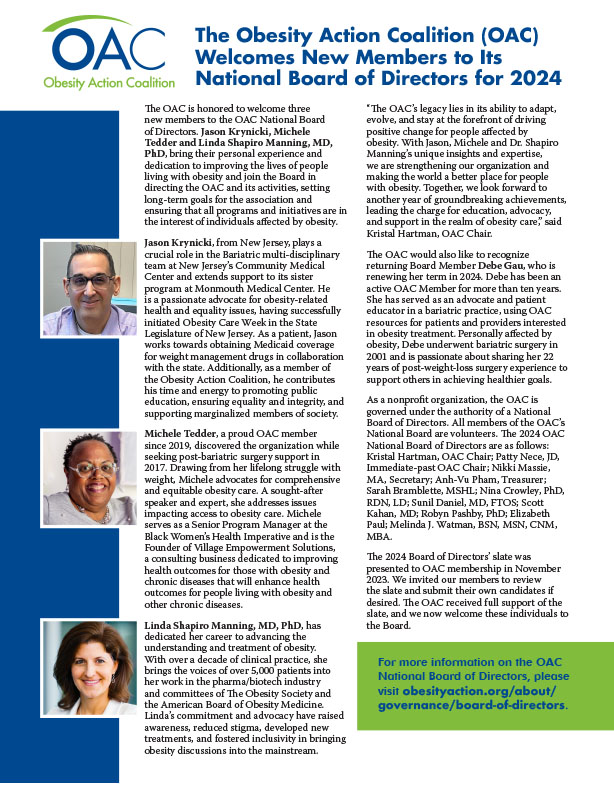Navigating the Ups and Downs of the First Year after Bariatric Surgery


by Kristal Hartman
Fall 2019
I want to be honest. My journey to bariatric surgery was a bumpy one. For 20 years I had tried to lose weight. I followed the advice of “eat a little less and walk a little more,” along with every fad diet you can imagine. I wanted to lose the weight on my own.
When I was 35, my doctor suggested I have bariatric surgery. I felt so much shame for needing surgery to manage my weight. But I struggled to lose even a few pounds, so how on earth was I going to lose 100 pounds with my body fighting me every step of the way?
It took me a full year to call the bariatric surgery office. With tears running down my cheeks and feeling like an immense failure, I made my first appointment. I didn’t know it then, but I would soon learn that surgery was the best gift I could have ever given myself and my loved ones.
A Look at Getting to Surgery and Beyond
Whether you are:
- Considering bariatric surgery
- Or have already had bariatric surgery
- Or are supporting someone else on their bariatric surgery journey
- Or are purely interested in bariatric surgery from a scientific or humanistic point of view…
It’s important to know that the first year following bariatric surgery will be a roller coaster of emotions.
It will be full of changes both big and small. I’m here to tell you to buckle your seatbelt and hang on to your hat because in spite of the ups and downs, you too can survive and thrive in the first year after bariatric surgery!
My pre-surgery program prepared me well, but everyone’s journey is unique. To be truthful, it is hard to know how major life changes will affect you until you are experiencing them.
Following is a very honest and real look ahead about both the positives and the challenges you can face in your first year after bariatric surgery. These topics aren’t spoken about enough in our bariatric community. The more you know about what may be ahead of you, the better prepared you will be to face them head on!
I am now five years post-bariatric surgery and when I look back, that first year was a complete blur. It was the slowest and fastest, hardest and easiest, worst and best year of my life. It makes no sense that one single year can be ALL of those things, right?!
So, let’s break the first year down a bit with a few examples:
Slowest
This seems like an odd concept. You may have spent the majority of your life experiencing weight bias and weight stigma, so why on earth is everyone so slow to notice that you are losing weight? You see and feel the changes occurring daily, weekly and monthly, but others may not be as quick to see some of them. I was more than six months post-surgery and had lost nearly 50 pounds before people started to say, “Have you lost weight?”
Fastest
Since most of your focus is on all that is changing in your life after bariatric surgery, the rest of the year somehow zooms by. After years of fighting with the scale and rarely seeing it move, suddenly your weight, your body and your life are all transforming rapidly.
I had surgery just before my 36th birthday and before I knew it, I was 37 and wondering where the year had gone! While each change feels HUGE during this first year, you won’t believe how quickly these lifestyle changes become regular habits and will just seem normal! You’ll be at your big one-year post-op appointment and you’ll likely feel like it was just a few months ago that you were nervously waiting to be taken back to surgery. Time flies when you are busy transforming your health and your life!
Hardest
There was one major adjustment that was both the most surprising and most difficult for me. It was how I felt about myself as I was losing weight and how others treated me as I was losing that weight.
I had a hard time adjusting to my new body. I lacked self-confidence as the weight left, but loose skin remained. At the same time—after feeling invisible for so many years—people began to notice me and interact with me in ways I had never experienced before. This made me very uncomfortable. I had spent years making eye contact, but not being “seen.” Now I found myself unable to make eye contact when I was finally being “seen.” To this day, I struggle with this deeply hurtful societal issue. And I know that people with obesity face it every day as well.
When others did eventually notice that I had lost weight, they would say, “Wow, you LOOK so good!” I know they meant well, but I couldn’t help but think, “They must have thought I looked awful before I lost weight!” I would always reply with, “Thank you, I FEEL so good!” That way I could focus on my health and not my weight.
It is kind of like being stuck between a rock and a hard place. After years of battling your weight, you want people to notice and to finally shed the stigma and bias around obesity. But at the same time, you don’t want them to notice at all. Simply put, you shouldn’t be treated differently just because you weigh less!
This mental/emotional/social component following bariatric surgery will be unwelcome for some and non-existent for others while the rest will fall somewhere in the middle. I want you to be prepared for it—no matter how you feel about it when it hits.
Easiest
I have never been more organized, disciplined or prepared in my whole life than I was during the year following bariatric surgery. Planning ahead for snacks and meals was a key to my success. It also made planning for everything from short adventures to long vacations easier to mentally prepare for because I was sticking to my plan exactly. I prepped my snacks and meals ahead of time and tracked all of my food and physical activity. When in doubt, go back to these basics. Habits such as these make life easier and weight management after surgery a success!
Worst
During the first few months after surgery, I ate separately from my family. It might seem odd to you, but I did it because it was extremely hard for me to see and smell the food my family was eating. I was on a bland liquid and soft diet and I wanted to stick to my post-op plan. It took several more months before I felt comfortable attending social events that revolved around food.
Depending on your relationship with food, you may mourn the loss of your previous way of life. Even if you were always dieting, you had choice and flexibility. Once you have chosen bariatric surgery, it is very important to stick to your plan. If you don’t, you could become seriously ill. During the first year after surgery, doing everything (birthdays, holidays, summer BBQ’s, etc.) for the first time without being able to eat the same food as everyone else may take some adjustment.
Best
There are SO MANY “bests” in the journey with bariatric surgery that I don’t even know where to start!
Best moments and milestones are deeply individual and personal to everyone. Yes, seeing the number on the scale change after so many years of not being able to impact that number feels incredibly amazing! However, it’s really the Non-Scale Victories (NSV’s) that feel the best! If you have chosen bariatric surgery, there is probably a list of things you hope to see change along your journey.
For me, I had two big bests. One of them was no longer taking the 14 prescription medications for my many obesity-related conditions. The other was being able to play and hang out with my kids instead of sleeping every free moment due to illness and exhaustion.
Hold on to those NSV’s – they will get you through the tough times in your first year following bariatric surgery.
Along with these examples of potential ups and downs that you’ll face, there are three major themes to prepare for during the first year after bariatric surgery:
1.) Nutrition: Follow every detail of your surgeon’s post-surgery plan. While it can feel extremely restrictive, it is designed for your health, safety and well-being. It will also jumpstart your progress toward successful weight-loss.
Your body will tell you what you can and can’t handle. Stop and really listen to it. If you get off-track one day, jump back on the next. Don’t let one meal choice or one difficult day derail you entirely. Every day is a new day!
2.) Exercise: Make sure you follow your surgeon’s recommendations for exercise. After being told my whole life to “exercise more,” it felt odd to be told to focus on the nutritional adjustments first and to only walk and move my body as I was able.
The most amazing part of that first year after surgery was transforming from a person that was in too much physical pain to be active to a person that was able to become active for the first time in years! And instead of dreading it, I began to crave movement, even if it was a short walk down the street and back. Find something fun (horseback riding, tai chi, curling, whatever!) that you never would have been able to do prior to weight-loss and celebrate that you are now able to do it!
3.) Emotions: The mental, emotional and social changes after bariatric surgery aren’t talked about as often as the physical and daily functional changes are. But they are just as REAL and equally important to be aware of.
Your body is going through a huge transformation, but the transformation occurring in your brain is just as big and just as important. Grant yourself grace, flexibility and patience to adjust to these changes. Be kind to yourself while you adjust to your evolving mental, emotional and physical states. Know that relationships with friends and family can and will change, some for the better and some for the worse. There will be people who support you and that you can lean on and there will be people that don’t like that your focus and priorities have changed. Find your village—whether it be at home, at school, at church, at bariatric support group meetings or with your fellow Obesity Action Coalition members who are experiencing the same things you are. We are your people and you are not alone!
Some Final Thoughts
I know, that was a lot! Are you still wondering:
- Is the first year after bariatric surgery easy? NO.
- Is it worth it? YOU BET IT IS.
If I could go back, I’d make the same decision over and over again. It will feel like your life has separated into two distinct periods: BBS vs ABS. That is, Before Bariatric Surgery versus After Bariatric Surgery. Or, as my good friend Dr. Walt Medlin calls it, his “Bonus Life.”
It will take adjustments and you may have to re-learn how you experience some aspects of life ABS. During the first year, all of these changes are SO BIG and have HUGE IMPACTS. But after that first year, everything sorts itself out and this will become second nature and your normal way of life. Embrace the ups and the downs and enjoy the roller coaster ride. We have a short time on this earth, so enjoy every moment!
About the Author:
Kristal Hartman is a proud member of the Obesity Action Coalition (OAC) and is honored to serve as a member on the OAC National Board of Directors. She had gastric sleeve surgery in August 2014 and it was the hardest and best decision she ever made for herself. She is passionate about her work in Biomarker and Genetic Research for Precision Medicine in Oncology, Obesity, and other Chronic Diseases.
by Chrystal Jones, OAC Advocacy Manager Spring 2024 The Obesity Action Coalition (OAC) is the only patient-focused…
Read Articleby Ava Zebrick Spring 2024 Meet Ava Zebrick, a powerhouse within the Obesity Action Coalition (OAC) whose…
Read ArticleThe OAC is honored to welcome three new members to the OAC National Board of Directors. Jason Krynicki,…
Read Article









